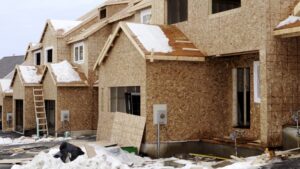NAHB
Despite inflation concerns and ongoing production bottlenecks, home builder confidence edged higher for the fourth consecutive month on strong consumer demand and limited existing inventory. Builder sentiment in the market for newly-built single-family homes moved one point higher to 84 in December, according to the NAHB/Wells Fargo Housing Market Index (HMI) released today. This ties the highest reading of the year that was posted in February.
“While demand remains strong, finding workers, predicting pricing, and dealing with material delays remains a challenge,” said NAHB Chairman Chuck Fowke. “Policymakers need to work on supply chain improvements and controlling costly inflation. Addressing lumber tariffs would be a good place to start.”
“The most pressing issue for the housing sector remains lack of inventory,” said NAHB Chief Economist Robert Dietz. “Building has increased but the industry faces constraints, namely cost/availability of materials, labor, and lots. And while 2021 single-family starts are expected to end the year 24% higher than the pre-Covid 2019 level, we expect higher interest rates in 2022 will put a damper on housing affordability.”
Derived from a monthly survey that NAHB has been conducting for 35 years, the NAHB/Wells Fargo HMI gauges builder perceptions of current single-family home sales and sales expectations for the next six months as “good,” “fair” or “poor.” The survey also asks builders to rate traffic of prospective buyers as “high to very high,” “average” or “low to very low.” Scores for each component are then used to calculate a seasonally adjusted index where any number over 50 indicates that more builders view conditions as good than poor.
The HMI index gauging current sales conditions rose one point to 90 and the gauge charting traffic of prospective buyers also posted a one-point gain to 70. The component measuring sales expectations in the next six months held steady for the third consecutive month at 84.
Looking at the three-month moving averages for regional HMI scores, the Northeast rose four points to 74, the Midwest posted a two-point gain to 74 and the South and West each posted a three-point rise to 87, respectively.



